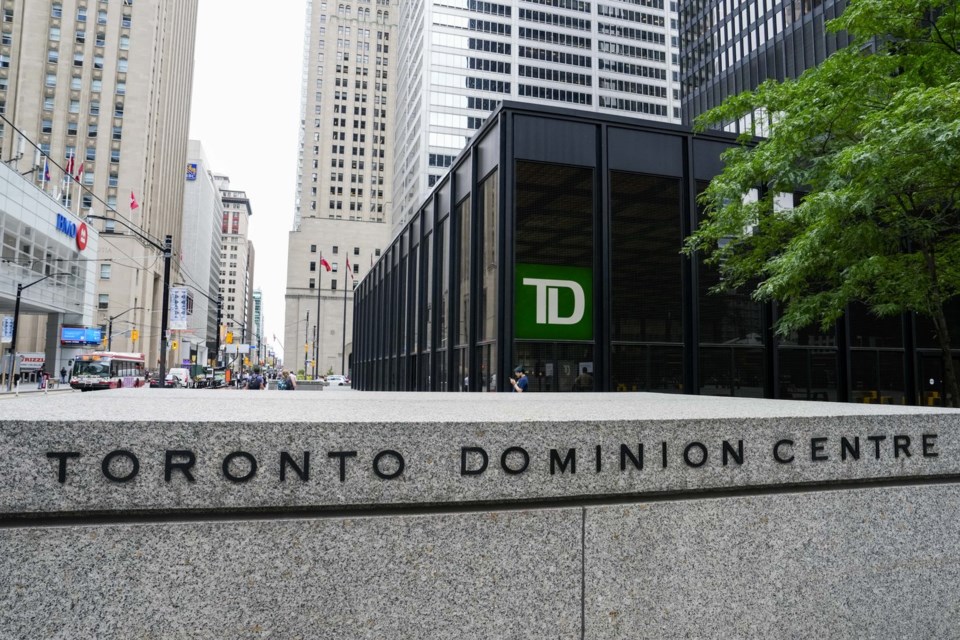TORONTO — The more than US$3-billion settlement TD Bank Group reached with U.S. regulators for its failures to oversee money laundering risks has underlined what some say are relatively weak enforcement efforts in Canada.
Denis Meunier, president of DMeunier Consulting Inc. and a former deputy director of Fintrac, said fines in Canada have to increase significantly to provide adequate deterrence and not become just a cost of doing business.
He says the federal government should add substantial fines for gross negligence, and increase the existing administrative penalties as fines in Canada haven't risen since 2008.
"It's time we take off the kid gloves," said Meunier. "You need penalties to punish, to really send a message: we're serious. And these penalties should be in the millions and potentially billions of dollars."
In Canada, Fintrac can level a maximum fine of $500,000 for each very serious reporting violation, or it can refer violations to potential criminal prosecution.
In contrast, the massive fine announced last week against TD came in part from U.S. rules that allow regulators to fine banks up to US$500,000 for each day they lack a functioning anti-money laundering program.
The limited fines available to Fintrac means the $9.2 million penalty it imposed on TD earlier this year was the largest it had ever issued.
Along with increasing fines, Meunier said he'd like to see increased resources and efforts to retain expertise at regulators, since it's hard to compete against what's offered in the private sector.
TD, for example, earlier this year hired Nathalie Martineau, a former executive from Fintrac, as its vice-president of anti-money laundering governance at the bank.
Canada needs to act on a range of anti-money laundering solutions because it's falling significantly short of global expectations, said Christian Leuprecht, a professor at the Royal Military College of Canada and co-author of the book "Dirty Money: Financial Crime in Canada."
"This is a pervasive problem in Canada that governments have largely been happy to ignore," said Leuprecht.
Somewhere between $45 billion to $113 billion is estimated to be laundered in Canada every year according to a report from the Criminal Intelligence Service Canada.
The scale of the problem means a range of approaches are needed to crack down, said Leuprecht.
"Yes, we need much more serious fines, but we also need capability capacity to investigate. We have terrible capacity in this country to investigate."
Banks have little chance of either getting caught, or being punished much if they do, with more need for co-ordinated international efforts, he said.
"Banks in this country have nothing to fear. We have a financial intelligence unit that is essentially an administrative compliance unit."
Meunier said he'd also like to see a more strengthened Fintrac, including giving the agency power to impose conditions on banks, as U.S. regulators have done with the cap on TD's asset growth south of the border.
Fintrac said in a statement that along with its record penalty against TD, it also required the bank to develop an action plan to address its deficiencies, and the regulator may levy additional penalties if the bank doesn't follow through with its plan.
TD has said it is making the investments, changes and enhancements required to deliver on commitments regarding its anti-money laundering program.
The federal government is also looking into ways to improve and strengthen Canada's anti-money laundering regime, including through public consultations last year. Earlier this year, it also boosted regulatory requirements for several non-bank entities like casinos and title insurers.
The finance department said in a statement that the government has zero tolerance for financial crimes, and is continuously working to improve Canada’s ability to combat financial crime.
A spokesman said the government has introduced a significant number of measures to strengthen Canada’s money laundering oversight, including increasing information-sharing, and since 2019 has invested close to $379 million to fight financial crimes.
The efforts come as regulators themselves also acknowledge the size of the problem.
Peter Routledge, head of the Office of the Superintendent of Financial Institutions, speaking at a risk conference earlier in October, said the agency is having to look closer at the issue.
"It's a risk that is more significant than I appreciated three years ago when I started the job," said Routledge.
"In the last year, the incidence of anti-money laundering issues has caused us to elevate that risk. And it's not a single event; there have been a bunch of events that have caused us to think about that."
But while there's increased attention on the issue, there little indication it's affecting money laundering flows, said Sanaa Ahmed, assistant professor at the University of Calgary's faculty of law.
"There is a lot of talk about it, but there doesn't seem to be that shift," said Ahmed.
The government sees too much benefit from the inward flows of international capital to crack down too much, she said.
"It appears fairly clear that the government doesn't want to."
This report by The Canadian Press was first published Oct. 15, 2024.
Companies in this story: (TSX:TD)
Ian Bickis, The Canadian Press




